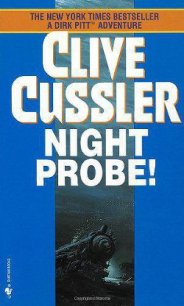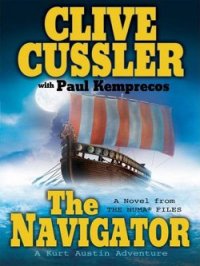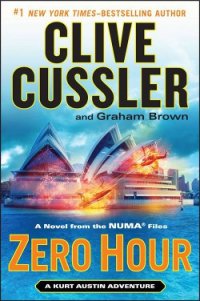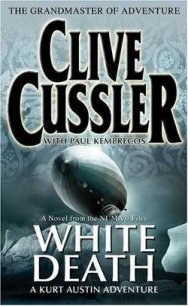Inca Gold - Cussler Clive (читаем полную версию книг бесплатно txt) 📗
Yuma had said all he had to say. He turned his back on Captain Diego and began climbing an almost unrecognizable trail between a fissure on the south wall of the mountain. No words were spoken between the Montolos. As if on silent command, ten men followed Billy Yuma while five remained behind to guard the prisoners.
The ascent went faster than the last time. He profited from his mistakes and ignored the wrong turns he had taken that curved into blind chutes. He remembered the good handholds and avoided the ones that were badly eroded. But it was still tough going on a trail no self-respecting pack mule would be caught dead on.
He would have preferred more men to support his assault, but the ten men struggling behind him were the only ones who were not afraid of the mountain. Or that was what they claimed. Yuma was not blind to the apprehension in their eyes.
After he reached a flat ledge, he stopped to catch his breath. His heart was beginning to pound, but his body was tensed with the nervous energy of a racehorse ready to burst from the gate. He pulled an old pocket watch from his pants pocket and checked the time. He nodded to himself in satisfaction and held the watch face for the others to see. They were twenty minutes ahead of schedule.
High above, on the mountain's summit, the helicopters hovered like bees around a hive. They were loaded with I as much of the treasure as they could lift before struggling into the sky and setting a course for the airstrip in the Altar Desert.
Colonel Campos's officers and men were working so fast, and were so awed by the golden hoard, none thought to check the security forces stationed around the base of the mountain. The radio operator on the peak was too busy coordinating the comings and goings of the helicopters to ask for a report from Captain Diego. No one took the time to look over the edge at the deserted encampment below. Nor did they notice the small band of men who were slowly climbing ever closer to the mountaintop.
Police Comandante Cortina was not a man who missed much. As his police helicopter rose from Cerro el Capirote for the return trip to his headquarters, he stared down at the stone beast and caught something that was missed by all the others. A pragmatic man, he closed his eyes and put it off as a trick of sunlight and shadows, or perhaps the angle of his view. But when he refocused his eyes on the ancient sculpture, he could have sworn the vicious expression had altered. The menacing look was gone.
To Cortina, just before it slipped out of view of his window, the fang-filled jaws on the guardian of the dead were frozen in a smile.
Pitt felt as though he were free-falling down a mammoth soda straw filled with cobalt blue mist. The sides of the vertical shaft of the sinkhole were round and smooth, almost as if they had been polished. If he hadn't been able to see his diving partner through the transparent water a short distance below, the shaft would have seemed bottomless. He cleared his ears as he descended, finning easily until he caught up with Giordino, who was towing their dry transport container past the elbow bend at the bottom of the shaft. Pitt helped by pushing his end through, and then followed in its wake.
He glanced at his depth-gauge needle. It was holding steady just shy of the 60-meter mark (197 feet). From here on, as the feeder stream sloped up toward the river, the water pressure would decrease, relieving any fear of depth blackout.
This was nothing like the dive into the sacrificial pool on the jungled slopes of the Andes. There, he had used a strong safety line with communications equipment. And except for the brief foray into the side cavern to rescue Shannon and Miles, he was never out of sight of the surface. This trip, they'd be entering an underworld of perpetual blackness no man or animal had ever seen.
As they moved their bulky canister through the twists and turns of the feeder stream leading to the river, Pitt recalled that cave diving is one of the most dangerous sports in the world. There was the Stygian blackness, the claustrophobic sensation of knowing you're far beneath the solid rock, the maddening silence, and the constant threat of disorientation if silt is stirred into impenetrable clouds. All this could lead to panic, which had killed scores of divers who were trained and equipped to deal with the perils, and made cave diving a morbid fascination that could not be learned from a book.
What was it his instructor from the National Speleological Society had told him before his first dive into a saltwater cave in the Bahamas? "Anyone can die at any time on a cave dive." In that peculiar way a particular fact learned in youth can stick in your mind forever, Pitt remembered that during the year 1974, twenty-six divers had lost their lives in Florida's underwater caves alone, and that the world total of deaths must have been three times that figure.
Pitt had never suffered from claustrophobia and fear seldom distracted him, but under hazardous conditions he experienced just enough uneasiness to sharpen his senses to unexpected dangers.
As it was, he didn't look forward to diving without a fixed guide or safety line. He well knew this operation could quickly turn into an exercise in self-destruction, especially once they became uncontrollably caught up in the river's current. Then there would be no escape until they reached the treasure chamber.
The horizontal fissure leading to the river expanded and tapered in a series of hourglass shapes. At 100 meters (328 feet) from the sinkhole they lost 90 percent of the outside light. They switched on the lamps attached to their hardhats. Another quick glance at his depth gauge told Pitt they had slowly ascended to within 20 meters (66 feet) of the water surface.
Giordino ceased his forward movement, turned, and waved with one hand. They had reached the outlet into the river system. Pitt answered with the hand signal for OK. Then he slipped his arm through the strap attached to the transport canister so it wouldn't be torn from him by unforeseen turbulence.
Giordino kicked his fins powerfully and angled upstream in a vigorous effort to pull the canister broadside into the river as far as possible before the main flow of the current swung him downstream before Pitt could exit the feeder stream. His timing was near perfect. Just as he lost his momentum and the current caught him in its grip, thrusting him around, Pitt and his end of the canister popped out of the side gallery.
As previously planned, they calmly inflated their buoyancy compensators, released the lead weights on the canister to make it buoyant, and calmly drifted upward while being carried downriver. After traveling close to 50 meters (164 feet), they broke surface, their lights revealing a large open gallery. The ceiling was covered by a strange black rock that was not limestone. Only when Pitt steadied his light did he recognize it as volcanic. Fortunately, the river's flow was smooth and uninterrupted by rocks, but the walls of the passage rose steeply out of the water, offering them no place to land.
He spit out his regulator mouthpiece and called to Giordino. "Be ready to cut to the side when you see an open spot on the bank."
"Will do," Giordino said over his shoulder.
They quickly passed from the volcanic intrusion back into limestone that was covered by an odd gray coating that absorbed their light beams and gave the impression the batteries were giving out on their lamps. A steady, thunderous sound grew and echoed through the passage. Their worst fears-- being swept through unnavigable rapids or going over a waterfall before making a landingsuddenly loomed in the darkness ahead.
"Keep a tight grip," Giordino shouted. "It looks like we're in for a tumble."




